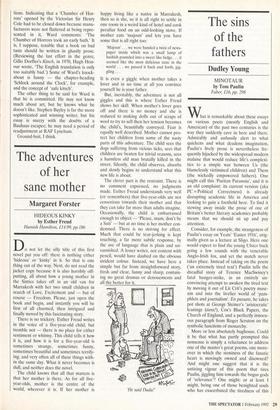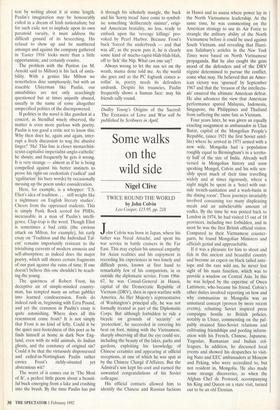The sins of the fathers
Dudley Young
MINOTAUR by Tom Paulin Faber, £16, pp. 298 hat is remarkable about these essays on various poets (mostly English and American) of the past two centuries is the way they suddenly cave in here and there. Admirably and unfussily alert to what quickens and what deadens imagination, Paulin's lively prose is nevertheless fre- quently hijacked by the widespread modern malaise that would reduce life's complexi- ties to a simple war between Us (the blamelessly victimised children) and Them (the wickedly empowered fathers). One might call this 'Puritan Paranoia', and it is an old complaint: its current version (aka PC = Political Correctness) is already disrupting academic life in America and looking to gain a foothold here. To find it stewing away inside the prose of one of Britain's better literary academics probably means that we should sit up and pay attention.
Consider, for example, the strangeness of Paulin's essay on Yeats' Easter 1916', orig- inally given as a lecture at Sligo. Here one would expect to find the young Ulster buck going a few rounds with the venerable Anglo-Irish fox, and yet the match never takes place. Instead of taking on the poem ('an extremely tired text') Paulin tells the dreadful story of Terence MacSwiney's fatal hunger-strike, in an entirely un- convincing attempt to awaken the tired text by moving it out of Lit Crit's poetry muse- um and into the livelier world of 'pam- phlets and journalism'. En passant, he takes pot shots at George Steiner's 'aristocratic' leanings (liens!), Cox's Black Papers, the Church of England, and a perfectly innocu- ous paragraph from Roger Scruton on the symbolic functions of monarchy.
More or less absolutely bughouse. Could it be that what has partly prompted this nonsense is simply a reluctance to address one of the master's great poems, one more- over in which the stoniness of the fanatic heart is movingly owned and disowned? And might one suggest that it is the untiring vigour of this poem that tires Paulin, jiggling him towards the bogus gods of 'relevance'? One might: or at least I might, being one of those benighted souls who has exacerbated the tiredness of this
text by writing about it at some length. Paulin's imagination may be honourably exiled in a dream of Irish nationalism; but for such exile not to implode upon its own paranoid vacuity, it must address the difficult ground of its beseeching. His refusal to show up and be numbered amongst and against the company gathered in 'Easter 1916' looks more than a little opportunistic, and certainly evasive.
The problem with the Puritan (as M. Arnold said to Milton) is his lack of amia- bility. With a genius like Milton we nonetheless dine sumptuously; but with an irascible Ulsterman like Paulin, our amiabilities are not only searchingly questioned but at times unjustly abused, usually in the name of some altogether unspecified politics of the disempowered.
If politics in the novel is like gunshot at a concert, as Stendhal wisely observed, the matter is even more parlous with poetry. Paulin is too good a critic not to know this. Why then does he, again and again, inter- rupt a lively discussion to wag the abusive finger? 'Ha! This line is closet monarchist- sexist-capitalist-imperialist-anglo-catholic' he shouts; and frequently he gets it wrong. It is very strange — almost as if he is being compelled against his better instincts to prove his right-on credentials ('radical' and 'egalitarian' his buzz words) by occasionally messing up the poem under consideration.
Here, for example, is a whopper: 'T.S. Eliot's idea of tradition. . . still weighs like a nightmare on English literary studies'. Cheers from the oppressed students. This is simply Punk Rock scored for PHDs, inexcusable in a man of Paulin's intelli- gence. Clap-trap is the word. Though Eliot is sometimes a bad critic (the envious attack on Milton, for example), his early essay on 'Tradition and the Individual Tal- ent' remains importantly resistant to the trivialising currents of modern amnesia and self-absorption; as indeed does the major poetry, which still shores certain fragments of our past against the ruins of time. If one doesn't believe this one shouldn't be teach- ing the young.
The quietness of Robert Frost, his deceptive air of simple-minded country- man, has tempted many an urban gabbler into learned condescension. Fools do indeed rush in, beginning with Ezra Pound, and yet the crassness in Paulin's essay is quite astonishing. Where does all this resentment come from? It is not simply that Frost is no kind of lefty. Could it be the quiet sure-footedness of this poet as he finds himself at home in dark New Eng- land, even with its wild animals, its Indian ghosts, and the constancy of original sin?
Could it be that the virtuously dispossessed and exiled-in-Nottingham Paulin rather envies Frost's richly-situated yet abstemious wit?
The worst of it comes out in 'The Most of It', a perfect little poem about a beauti- ful buck emerging from a lake and crashing into the brush. By the time Paulin has put
it through his scholarly mangle, the buck and his 'horny tread' have come to symbol- ise something 'deliberately sinister', origi- nal American brutality, no less, ready to embark upon the 'revenge killings' pro- voked by Pearl Harbor. Because Frost's buck 'forced the underbrush — and that was all', as the poem puts it, he is clearly some kind of macho-rapist-blah-blah-blah, off to 'lick' the Nip. What can one say?
Always wrong to let the sun set on thy wrath, mama done told me. As the world she goes and as the PC fogbank comes a- rollin' in, poetry needs its defenders undrunk. Despite his truancies, Paulin frequently shows a human face: may his friends rally round.
Dudley Young's Origins of the Sacred: The Ecstasies of Love and War will be published by Scribners in April.



















































 Previous page
Previous page